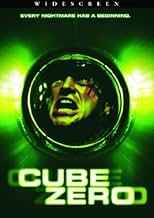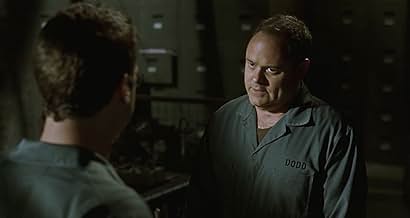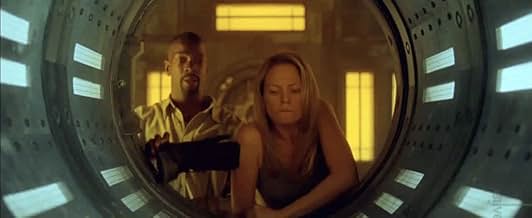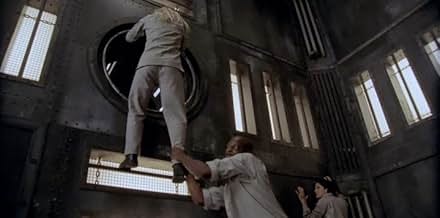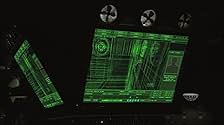NOTE IMDb
5,6/10
44 k
MA NOTE
Un jeune programmeur dont le travail est de veiller sur la réalité.Un jeune programmeur dont le travail est de veiller sur la réalité.Un jeune programmeur dont le travail est de veiller sur la réalité.
- Réalisation
- Scénario
- Casting principal
- Récompenses
- 3 victoires et 2 nominations au total
Joshua Peace
- Finn
- (as Josh Peace)
Flossie McKnight
- Female Doctor
- (as Araxi Arslanian)
Kyle Derek
- Squad Leader
- (as Kyle McDonald)
Avis à la une
I was one of the enthusiasts of the original. It seemed a clever solution to one of filmdoms most persistent challenges: how to stage drama.
Noir is our most basic cinematic model. The core of noir is a universe where capricious fate toys with human destiny in cruel and arbitrary ways. "Cube" cleverly merged a modern noir vision with a solution to the staging problem.
Then along came the sequel which had no understanding of what made the original appealing and important. They turned it into a conventional government plot thriller with all the baggage that carries. Along the way, they introduced some pseudomathematical notions that were bizarre.
If there is anyone on the planet that would know how such a government program would work, it would be me. I wrote a comment about this which triggered a couple dozen messages among the editor of a film magazine, myself and the original author of "Hypercube."
As it happens, the original script was more true to what made the first one work, but it was coopted and changed by the same hack behind this.
So once again, here we have some sort of evil experiment by some agency. In the last one, that was actually a major weapons company. The one clever idea is similar to "Saw," where we watch the watchers of watchers watch. This folding is supposed to impute an evil to us that we see in the maniacal Dennis Hopper impersonator.
One of the intermediate watchers draws comics. This is textbook folding. Not clever, not worthy.
Ted's Evaluation -- 1 of 3: You can find something better to do with this part of your life.
Noir is our most basic cinematic model. The core of noir is a universe where capricious fate toys with human destiny in cruel and arbitrary ways. "Cube" cleverly merged a modern noir vision with a solution to the staging problem.
Then along came the sequel which had no understanding of what made the original appealing and important. They turned it into a conventional government plot thriller with all the baggage that carries. Along the way, they introduced some pseudomathematical notions that were bizarre.
If there is anyone on the planet that would know how such a government program would work, it would be me. I wrote a comment about this which triggered a couple dozen messages among the editor of a film magazine, myself and the original author of "Hypercube."
As it happens, the original script was more true to what made the first one work, but it was coopted and changed by the same hack behind this.
So once again, here we have some sort of evil experiment by some agency. In the last one, that was actually a major weapons company. The one clever idea is similar to "Saw," where we watch the watchers of watchers watch. This folding is supposed to impute an evil to us that we see in the maniacal Dennis Hopper impersonator.
One of the intermediate watchers draws comics. This is textbook folding. Not clever, not worthy.
Ted's Evaluation -- 1 of 3: You can find something better to do with this part of your life.
One question I always have about these cube movies is, how does throwing a boot into the empty room tell you it's safe or not? This feels like rehash from the other sequels. But, in those films we discover some traps are triggered by other things, not by weight, or movement, or sound, but heat.
After this scene, one man exclaims perhaps it was triggered by heat or sound, but that isn't possible because the boot hitting the floor was pretty loud. Most likely it was triggered by a camera picking up a human form in the middle of the room.
After being disappointed by the follow through of part 1 and 2, I looked forward to a prequel finally making some sense of all this, and being a enjoyable film. Kind of like what Hellraiser 3 Bloodline did for that series.
Now we have 2 workers, overseeing this project to some capacity. We never see their higher ups, but we do see a higher level of command in part 2.
They seem to not mind too much what is going on, for they believe they men and women inside the cube are convicted criminals.
We know this to not be the truth at all.
The fact that in part 1 they followed a puzzle of numbers, primes in particular, in part 2, well I don't remember what they followed then, 5 dimensional cubes are funny that way. BUt, in this one, they find a similar puzzle, but this time in sets of letters.
For lack of ingenuity, and originality, I scoff at the simplicity of the parallel plots at this point, but I trudge on, without judgment... keeping my mind on the third exit.
"When the rooms align what's the first thing that happens?" "Clean Sweep" Which is what we saw at the very end of part 2... you ever wonder why at the end of part 2 when the girl, company employee plant in the cube, escapes the cube, with some sort of plumb device around her neck intact, as the cube seems to "clean sweep" itself into oblivion, they kill her? Did you think that question was going to be answered in the next movie? Do you still think it's going to be answered, in Cube Zero? Owen reaching the exit room reminds me a lot of the ending of Cube 1, I suppose that was the point.
Exit Procedure is very Nazism isn't it.
Anyways, I noticed later on they weren't even waiting for the boot to hit the floor before entering a new room, that didn't make a whole lot of sense, although the sound vibration death was quite cool.
Pretty nice ending, the way Wynn becomes Kazan-ized. Makes you wonder just how Kazan got the way he was doesn't it? People ask what is the point of this movie, or this trilogy, or franchise... and to my knowledge there is no point. Unless you look for a more anamorphic point. And that is the point within.
There is no great moral here, no blatant and obvious tell tale morality. No, be good or this could happen to you, there is no rhyme nor reason. Perhaps the only point to be gleamed from such an adventure is thus.
The CUBE is the mind. The traps are desires, ignorance, apathy, and the like. We are lab rats in consciousness, trying to get from birth to the white light at the end, without falling into the traps of our own egos if you will.
At least, that is my perspective.
After this scene, one man exclaims perhaps it was triggered by heat or sound, but that isn't possible because the boot hitting the floor was pretty loud. Most likely it was triggered by a camera picking up a human form in the middle of the room.
After being disappointed by the follow through of part 1 and 2, I looked forward to a prequel finally making some sense of all this, and being a enjoyable film. Kind of like what Hellraiser 3 Bloodline did for that series.
Now we have 2 workers, overseeing this project to some capacity. We never see their higher ups, but we do see a higher level of command in part 2.
They seem to not mind too much what is going on, for they believe they men and women inside the cube are convicted criminals.
We know this to not be the truth at all.
The fact that in part 1 they followed a puzzle of numbers, primes in particular, in part 2, well I don't remember what they followed then, 5 dimensional cubes are funny that way. BUt, in this one, they find a similar puzzle, but this time in sets of letters.
For lack of ingenuity, and originality, I scoff at the simplicity of the parallel plots at this point, but I trudge on, without judgment... keeping my mind on the third exit.
"When the rooms align what's the first thing that happens?" "Clean Sweep" Which is what we saw at the very end of part 2... you ever wonder why at the end of part 2 when the girl, company employee plant in the cube, escapes the cube, with some sort of plumb device around her neck intact, as the cube seems to "clean sweep" itself into oblivion, they kill her? Did you think that question was going to be answered in the next movie? Do you still think it's going to be answered, in Cube Zero? Owen reaching the exit room reminds me a lot of the ending of Cube 1, I suppose that was the point.
Exit Procedure is very Nazism isn't it.
Anyways, I noticed later on they weren't even waiting for the boot to hit the floor before entering a new room, that didn't make a whole lot of sense, although the sound vibration death was quite cool.
Pretty nice ending, the way Wynn becomes Kazan-ized. Makes you wonder just how Kazan got the way he was doesn't it? People ask what is the point of this movie, or this trilogy, or franchise... and to my knowledge there is no point. Unless you look for a more anamorphic point. And that is the point within.
There is no great moral here, no blatant and obvious tell tale morality. No, be good or this could happen to you, there is no rhyme nor reason. Perhaps the only point to be gleamed from such an adventure is thus.
The CUBE is the mind. The traps are desires, ignorance, apathy, and the like. We are lab rats in consciousness, trying to get from birth to the white light at the end, without falling into the traps of our own egos if you will.
At least, that is my perspective.
This film begins with a man named "Ryjkin" (Jasmin Geljo) waking up and finding himself in a symmetrical room with an exit hatch on all four walls along with one on the floor and one on the ceiling. After choosing to go through one of the exists leading into a similar room, he accidentally triggers a mechanism which sprays him with an unknown liquid. At first, he thinks it is just water and being quite thirsty, he proceeds to lick as much of it off of his skin as possible. Minutes later, however, he realizes that the liquid is a type of acid which leads to a gruesome conclusion. Then scene then shifts to a control room where two technicians named "Eric Wynn" (Zachary Bennett) and "Dodd" (David Huband) where Ryjkin's demise is playing out on a computer screen in front of them. Having seen numerous scenes similar to this, neither Wynn nor Dodd are overly surprised. Yet even though Wynn expresses his distaste for this macabre incident, he accepts the corporate explanation that the people within the cubical apparatus are condemned prisoners being given an opportunity for their freedom--if they can carefully negotiate their way through the hazards within this deadly maze. Even so, Wynn still has a number of questions regarding the entire setup and his curiosity is piqued even further when he discovers that one of the prisoners named "Cassandra Rains" (Stephanie Moore) doesn't have the necessary consent form within her files. This prompts even more concern on his part that he is involved in something so terribly horrific that it defies imagination--and that both he and Dodd could suffer from the same fate. Now, rather than reveal any more, I will just say that this film essentially serves as a prequel to the original movie produced seven years earlier and, as such, provides more details about the mechanism itself. And while this particular film is certainly not bad by any means, I do not believe it is quite as good as its two predecessors and I have rated it accordingly. Average.
STAR RATING:*****Unmissable****Very Good***Okay**You Could Go Out For A Meal Instead*Avoid At All Costs
Another group of individuals awake to find themselves trapped within the confinement of the now legendary Cube,with only their wits and their speed to save them.In this instalment,we also learn more about the people behind the Cube and the sinister true reason for it's existence...
As I watched Cube:Zero stretch out before me,I couldn't help but feel I was watching yet another example of a great original film,a far-fetched but undeniably inventive and thoroughly engaging science-fiction caper,being milked for all it's worth with tacky video sequels.For any gore-hounds out there,there's some impressive grisly dismemberment scenes to behold and the original angle remains as clever as ever,but it's no cleverer than it was before.The film is just that:a desperate and sad extension of it's original self.It's never made clear what the Zero in the title means,but zero is a name for cannabis,and that's sort of what it feels the screen-writers had been puffing too much of when they penned another entry into the Cube franchise.With some naff new central characters introduced (typical and dourly indicative of this kind of video sludge!) and a slumberous pace,one can only hope that this marks the final part of the now depressingly wearisome Cube franchise.**
Another group of individuals awake to find themselves trapped within the confinement of the now legendary Cube,with only their wits and their speed to save them.In this instalment,we also learn more about the people behind the Cube and the sinister true reason for it's existence...
As I watched Cube:Zero stretch out before me,I couldn't help but feel I was watching yet another example of a great original film,a far-fetched but undeniably inventive and thoroughly engaging science-fiction caper,being milked for all it's worth with tacky video sequels.For any gore-hounds out there,there's some impressive grisly dismemberment scenes to behold and the original angle remains as clever as ever,but it's no cleverer than it was before.The film is just that:a desperate and sad extension of it's original self.It's never made clear what the Zero in the title means,but zero is a name for cannabis,and that's sort of what it feels the screen-writers had been puffing too much of when they penned another entry into the Cube franchise.With some naff new central characters introduced (typical and dourly indicative of this kind of video sludge!) and a slumberous pace,one can only hope that this marks the final part of the now depressingly wearisome Cube franchise.**
A perfectly adequate prequel to the first film. This time we see the men who operate the cube, but it doesn't take long to realise that they are still within the system.
This film owes a lot to the identity loss themes seen in Dark City and even the matrix, as the film resolves to show existence as a hierarchical and circular metaphor of continuous control.
This is low budget, but has a dated feeling that the original Cube film did not. Writers and set designers face a lot of pressure to create fresh ideas, and new ideas are sadly lacking here. The horror element is delivered well, but the sci-fi elements are rather tacked on.
(Saw this at Sci-fi London)
This film owes a lot to the identity loss themes seen in Dark City and even the matrix, as the film resolves to show existence as a hierarchical and circular metaphor of continuous control.
This is low budget, but has a dated feeling that the original Cube film did not. Writers and set designers face a lot of pressure to create fresh ideas, and new ideas are sadly lacking here. The horror element is delivered well, but the sci-fi elements are rather tacked on.
(Saw this at Sci-fi London)
Le saviez-vous
- AnecdotesThe exit machine is a slightly reworked, old Moviola film editing machine with a couple of raw speakers and a YES/NO button added.
- GaffesThe file cabinets in the observation room are marked with name ranges; one drawer is listed as "Rabinovich - Rabe", which is not in alphabetical order.
- Crédits fousZero the fish as himself
- ConnexionsFeatured in WatchMojo: Top 10 Horror Movie Prequels (2018)
- Bandes originalesMessage From Buddha
Performed by Norman Orenstein
Written by Norman Orenstein
Published by Norman Orenstein Music (Socan)
Meilleurs choix
Connectez-vous pour évaluer et suivre la liste de favoris afin de recevoir des recommandations personnalisées
Détails
Box-office
- Budget
- 1 200 000 $CA (estimé)
- Durée
- 1h 37min(97 min)
- Couleur
- Mixage
- Rapport de forme
- 1.85 : 1
Contribuer à cette page
Suggérer une modification ou ajouter du contenu manquant


